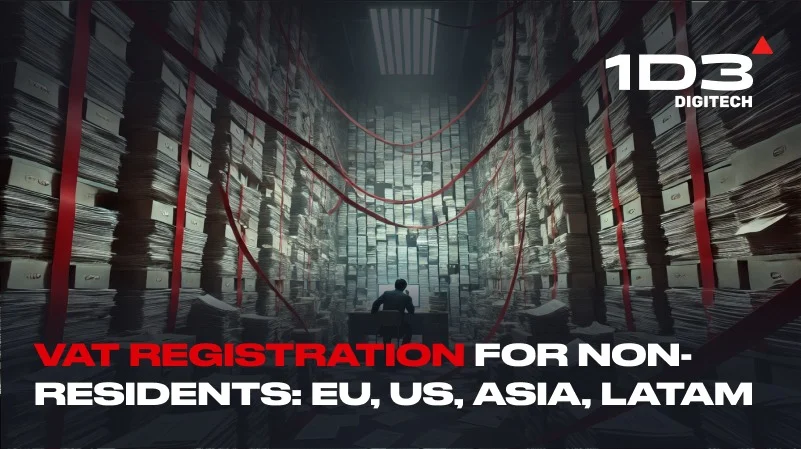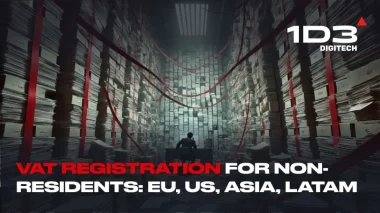Navigating VAT registration is no small feat for non-resident companies. Irina Cherkashina, a Tax and Finance Manager at 1D3 DIGITECH, brings her extensive expertise to help businesses understand and tackle these challenges effectively. From Europe to Asia and LATAM, the rules vary widely, creating a maze of compliance requirements. For businesses selling digital goods and services, understanding these challenges and finding effective solutions is critical for global success.
The Digital Revolution and VAT Compliance
Over the past few decades, the rapid development of digital technologies and the expansion of the internet have dramatically reshaped the global economy. New types of services, such as online courses, digital subscriptions, streaming platforms, and the sale of electronic goods, have emerged. These services often operate outside traditional tax systems, enabling companies to bypass VAT obligations.
ENSURE 100% VAT COMPLIANCE WORLDWIDE
GET IN TOUCH WITH 1D3Navigating the VAT Landscape
In response, more and more nations have introduced mandatory VAT for digital services. These changes present new challenges for businesses and tax authorities alike, as the digital economy demands unique approaches to taxation and more complex mechanisms for registration and compliance.
VAT (Value-Added Tax) is one of the primary indirect taxes levied on the consumption of goods and services in most countries. In some regions, similar taxes include sales tax, CT, or GST.
These taxes play a critical role in financing national budgets and economies. The global reach of digital services, delivered over the internet, transcends geographical boundaries, creating challenges for traditional tax systems and necessitating new approaches to taxation and registration for companies operating internationally.
Increasingly, countries are imposing VAT registration requirements on foreign companies selling digital services to their citizens, creating a major task fraught with difficulties stemming from differences in tax systems, registration requirements, and business practices across countries.
General Principles of VAT Registration for Non-Residents
For non-resident companies engaging in trade or providing services within a country, VAT registration is mandatory when they reach specific sales thresholds or offer services subject to local legislation.
The challenges faced by non-resident companies in VAT registration vary depending on national legislation, tax structures, and administrative complexities. However, there are common principles underlying VAT registration systems worldwide.
In most cases, non-resident companies are required to:
- Tax Registration: A company must register with the tax authorities in the country where it conducts economic activities, such as providing digital services to local users. In some countries, non-resident companies cannot register independently and must appoint a tax representative responsible for their tax obligations in the respective jurisdiction.
- Record-Keeping and Reporting: Companies must maintain VAT records and submit regular tax declarations.
For many non-resident companies, these steps can be challenging due to differences in national practices, language barriers, and the complexity of interacting with local authorities.
Challenges of VAT Registration in Europe
The European Union (EU) and its member states operate under a unified VAT directive framework, but each country retains the right to modify its rules. Although the EU introduced the One Stop Shop (OSS) system to simplify VAT reporting and payment, companies operating in Europe still encounter numerous challenges in VAT registration and OSS usage.
Common Challenges
- Service Classification and Taxation Specifics: Properly classifying services according to European tax standards can be difficult. Digital services may encompass a wide range of products, such as web hosting, online education, digital subscriptions, and games. Each category may be subject to different tax rates or exemptions, requiring careful record-keeping and reporting.
- Choosing a Registration System for Non-EU Companies: Companies selling digital services in the EU must decide whether to register under the OSS system or obtain VAT registration in each country where sales occur. The OSS system is more convenient, as it allows companies to choose one EU country for VAT registration. This country becomes the hub for VAT filings and payments, which are then distributed among all countries where digital services are sold.
- Appointing a Tax Representative for Non-EU Companies: If a company from a non-EU country lacks a physical presence in the EU, it must appoint a tax representative in the chosen EU country for OSS registration. This representative ensures compliance and fulfils legal VAT obligations. The cost of such services, which includes VAT registration, quarterly VAT reports, consultations, and representation, can reach thousands of euros annually, depending on the country.
Solutions
Working with professional consultants, appointing a tax representative, or outsourcing tax accounting are common strategies. Alternatively, partnering with a Merchant of Record (MoR) company can streamline the process, as the MoR handles VAT obligations on your behalf, from registration to reporting and payments.
Challenges of VAT Registration in the U.S.
The situation in the U.S. differs significantly from Europe, as there is no federal VAT. Instead, sales tax is regulated at the state level, with each jurisdiction having its own rules, creating a complex landscape for foreign companies.
Key Issues
- State-Level Taxation: The U.S. has 50 states, each with its own rules for taxing digital services. Counties, districts, and cities may also impose their own sales tax rates, which are added to state taxes. For example, states like New York and Arizona tax SaaS and digital subscriptions, while others, such as Florida, may exempt these services.
- Registration Thresholds: Each state sets its own registration thresholds, which obligate non-resident companies to register and collect sales tax upon reaching them. For instance, a company selling digital services must collect sales tax in Rhode Island if its sales exceed $100,000 or 200 transactions. In Texas, the threshold is $500,000.
- Registration and Reporting: Companies providing digital services in multiple states must register and file tax declarations in each state, adding to administrative burdens.
Penalties for Non-Compliance
Failure to meet registration and tax collection requirements can result in fines and penalties. For example, in California, a company that fails to register for sales tax can be fined 10% of the unpaid tax plus daily penalties for late payments.
Solutions
Using automated systems to manage sales tax collection and consulting tax specialists can help companies comply with U.S. regulations. Alternatively, partnering with a Merchant of Record simplifies compliance, as the MoR assumes responsibility for sales tax registration, collection, and remittance.
Challenges of VAT Registration in Asia
Navigating VAT registration across Asia is a complex task due to diverse legal frameworks and administrative requirements. While the region offers immense opportunities for digital businesses, compliance demands a deep understanding of local rules. Here is an overview of the key challenges in major Asian markets:
China
China’s VAT system is both lucrative and challenging for foreign companies. Successfully entering this market requires navigating stringent regulations:
- Legal Entity Requirement: Non-resident companies must set up a branch, representative office, or joint venture. This process is resource-intensive, involving significant costs and delays.
- ICP Certificate: Internet-based services require an Internet Content Provider certificate to operate legally within China’s strict regulatory environment.
- Tax Invoices (Fapiao): Compliant invoices are mandatory for all transactions, requiring detailed record-keeping in Chinese.
- Regular VAT Filings: Businesses must file periodic VAT declarations, adhering to local language and format requirements.
The complexities of VAT compliance in China often necessitate partnering with local advisors to overcome bureaucratic hurdles, manage content localization, and meet tax obligations efficiently.
India
India’s GST system imposes unique requirements on foreign companies offering digital services. Key considerations include:
- Authorized Representative: Foreign businesses must appoint a local representative to handle compliance and communication with tax authorities.
- State-Specific Requirements: Registration must include a designated business location within the state where the company operates.
- GST Rates: Digital services are taxed at 18%, while high-risk or luxury services like gambling are taxed at 28%.
- Early Registration: Companies must register at least five days before initiating operations.
India’s complex regulatory environment demands precision in filings and adherence to deadlines to avoid penalties. Employing local consultants can simplify compliance efforts.
Japan
Japan’s VAT, known as the Japanese Consumption Tax (JCT), presents detailed and structured requirements for foreign businesses. Key points include:
- Registration Threshold: Companies exceeding 10 million yen in annual sales or during the first six months of the prior calendar year must register.
- Qualified Invoice System: Introduced in October 2023, this system requires foreign companies to issue invoices meeting Japanese standards to ensure their clients can claim tax deductions.
- Local Representation: A tax representative must handle compliance, including filings and record-keeping.
Non-compliance with JCT standards can impose additional tax burdens on clients, reducing the appeal of foreign services in Japan. A thorough understanding of the Qualified Invoice System is essential for smooth operations.
South Korea
South Korea’s VAT system emphasizes detailed reporting and compliance accuracy. Foreign companies must:
- Register with the National Tax Service (NTS): This involves submitting required documents and adhering to local regulations.
- Submit Quarterly Filings: Reports must include transaction details such as service types, values, and VAT amounts, all in Korean won.
- Provide Detailed Transaction Statements: These must include the recipient’s Business Registration Number, service specifics, and delivery dates.
The need for precision in filings makes local expertise invaluable to avoid penalties and maintain compliance.
Solutions
To successfully navigate the complexities of VAT registration in Asia, partnering with a Merchant of Record (MoR) is a powerful solution. An MoR takes responsibility for VAT compliance, including registration, reporting, and payments, ensuring businesses can operate smoothly while focusing on growth and market expansion.
Challenges of VAT Registration in Latin America
Latin America’s growing digital markets offer significant opportunities, but VAT registration in this region is often complex due to bureaucratic and administrative hurdles. Here is a detailed breakdown of the key challenges in major LATAM countries:
Mexico
In Mexico, VAT registration is mandatory from the first sale. However, the process is time-consuming due to bureaucratic complexities:
- Registration Timeline: Although companies legally have 30 days to register after their first sale, starting the process months in advance is advisable due to delays in document processing.
- Local Tax Representative: A representative is required to handle filings and communication with the Mexican tax authority (SAT). Choosing a reliable representative is critical to avoid compliance issues.
- Domicile Requirement: A local address is essential for registration and ongoing compliance.
- Monthly Reporting: VAT declarations must be filed monthly, incurring additional costs for accounting services.
- Payment Options: Companies can:
- Open a local bank account (a paid service).
- Use a foreign bank with a local agent agreement (also paid).
- Pay through an intermediary service (monthly fees apply).
These requirements, combined with the expenses for local representatives and payment systems, result in significant operational costs.
Argentina
Argentina presents unique challenges for VAT registration, largely driven by its evolving tax policies and administrative requirements. Key aspects include:
- Local Tax Representative: A representative is mandatory for handling registration and ongoing compliance.
- Immediate Tax Obligation: VAT is due from the first transaction, requiring businesses to prepare for compliance as soon as operations begin.
- Policy Changes: Historically, payment processors such as Visa and Mastercard withheld VAT on behalf of foreign companies, simplifying compliance. However, as of September 2024, this mechanism was discontinued. Companies must now:
- Register directly with Argentina’s tax authority (AFIP).
- File VAT declarations independently.
- Remit taxes directly to the government.
This transition to direct compliance places a greater administrative burden on foreign companies, especially those without local expertise. The change highlights the importance of building robust internal systems or engaging external advisors to manage compliance effectively.
Brazil
Brazil is undergoing a significant tax reform, set to take effect in 2026, that will fundamentally alter the landscape for VAT compliance. The reform seeks to modernize the country's notoriously complex tax system while creating clearer obligations for foreign digital service providers. Key details include:
- Current State: Currently, foreign companies providing digital services are not required to register for VAT. This lack of obligations has provided operational ease but limited tax accountability.
- Reform Goals: The reform aims to replace the outdated system with two new indirect taxes designed to simplify and streamline tax collection. These taxes will apply uniformly to both B2C and B2B transactions.
- New Obligations: Foreign providers will be required to:
- Register for VAT within Brazil.
- Collect and remit taxes on all transactions involving Brazilian consumers.
- Implement robust administrative processes to comply with local filing and payment schedules.
These changes are expected to create a more predictable tax environment but will also impose significant administrative responsibilities on foreign businesses. Companies will need to reassess their operations to accommodate the new requirements and ensure compliance with the updated framework.
Other LATAM Countries
Several LATAM countries have introduced hybrid VAT systems combining local registration and intermediary mechanisms:
Peru, Ecuador, and Costa Rica: These countries require non-resident companies to register for VAT and submit monthly declarations. Failure to comply may result in fines or inclusion on a non-compliance list..
Chile: Foreign providers of digital services must register with local tax authorities. While companies can handle registration themselves, appointing a local representative is a common practice to manage filings and payments.
Colombia: Companies offering digital services can either register as VAT payers or use a withholding system. The Colombian tax authority provides a list of tax agents to facilitate this process.
Solutions
To effectively navigate the complex VAT systems in LATAM, partnering with a Merchant of Record (MoR) is a strategic solution. An MoR assumes full responsibility for VAT registration, reporting, and remittance, allowing companies to focus on expanding their presence in this dynamic region.
Conclusion
VAT registration for non-resident companies is complex and varies significantly by region. Differences in legislation, registration thresholds, documentation requirements, and bureaucratic processes create substantial challenges. For successful global operations, non-resident companies must carefully analyze each market’s requirements, consult with local tax advisors, and ensure compliance to minimize risks and avoid penalties.
TRY THE MOST COST-EFFECTIVE MERCHANT OF RECORD SERVICE
GET IN TOUCH WITH 1D3Partnering with a Merchant of Record can transform these challenges into manageable tasks. By handling VAT registration, compliance, and payments on your behalf, an MoR lets you focus on scaling your digital business while ensuring full compliance with global tax laws.





